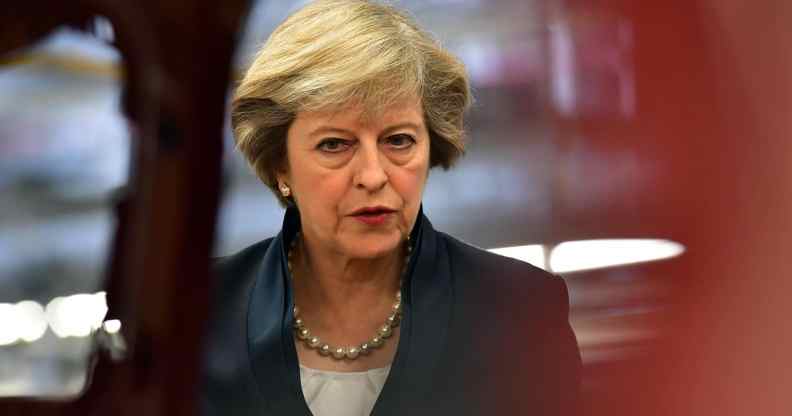Fact check: What actually is Theresa May’s record on LGBT rights?

As the election campaign steps up, a viral meme is circulating about Prime Minister Theresa May’s record on LGBT rights – but is it actually true?
Senior opposition figures are among those to have shared a critical summary of the Conservative leader’s record on LGBT rights, across her 20 years in Parliament.
The viral internet meme highlights her apparently hostile record on LGBT equality – citing the times she voted against same-sex adoption and the repeal of Section 28.
While many of the stances on the list are correct, it it does not paint a full or accurate picture of the leader’s record – twisting and missing key elements.
This is Theresa May’s awful voting record throughout the years. Spread this far and wide. #GeneralElection pic.twitter.com/PeBaWGKJj0
— George Aylett (@GeorgeAylett) April 18, 2017
It is certainly true that Mrs May started out her Parliamentary career as an opponent of LGBT rights in 1997, entering politics as a firm opponent of equality in line with her party’s stance.
Under Iain Duncan Smith’s leadership, Mrs May obeyed the Tory whip to vote against a number of LGBT rights reforms, including an equal age of consent and same-sex adoptions.
But within a few years, pro-LGBT voices had become more mainstream within the Conservative Party, and May’s stance was softening.
In 2004, under leader Michael Howard, she voted in favour of civil partnerships for same-sex couples – the first time she had openly backed an LGBT rights measure.
At the same time she abstained on the Gender Recognition Act, declining to side with Tory hardliners who voted against the law.
Both her personal stance and her party’s would continue to shift.
Under David Cameron’s leadership, it was Mrs May who helped first ensure that proposals for same-sex marriage made it onto the Conservative agenda – promising a review ahead of the 2010 election.
For the election, Mrs May penned the Conservative Party’s ‘Contract for Equalities’ – released alongside the party’s manifesto – in which she pledged to “consider the case for changing the law to allow civil partnerships to be called and classified as marriage”.
The pledge outflanked Gordon Brown’s Labour Party, which had ruled out same-sex marriage.
It was also ahead of the 2010 election that May spoke publicly about a change of heart on LGBT issues, taking the chance to disavow her early voting record.
Speaking on Question Time, she conceded: “I have changed my view. If those votes were taken today, I would take a different vote.
“On gay adoption I have changed my mind… because I have been persuaded that when you are looking at the future for a child, I think it’s better for a child who is perhaps in an institutional environment, if they have an opportunity of being in a stable, family environment – be that a heterosexual couple or a gay couple.
“I think it’s more important that that child is in that stable and loving environment and I have genuinely changed my mind on that.”
Her stance continued to shift as Home Secretary and Equalities Minister during the Coalition government.
In government, it was Theresa May and Lib Dem minister Lynne Featherstone who helped secure a Coalition-wide agreement to bring about same-sex marriage, after it was left out of the Coalition Agreement.
Baroness Featherstone – the architect of the equal marriage law – has since affirmed that May’s support was instrumental in convincing the Conservative leadership and the Cabinet to agree to move forward with the proposal, which resulted in the 2013 Marriage (Same Sex Couples) Act.
In her book ‘Equal Ever After’, Baroness Featherstone praised Theresa May as an “unsung hero” of the push for marriage. Mrs May was also key to ensuring that proposals allowed for religious same-sex weddings as well as civil weddings, as the legislation was drafted.
Since becoming Prime Minister last year, Mrs May has not placed a strong focus on LGBT rights – though she did overturn a Cameron-era decision to block plans for mandatory sex and relationship education in all schools.
Asked if gay sex is sinful in an interview last week, she replied simply, “no”.
Despite her evolving stance, Mrs May continues to face strong criticism on some LGBT issues.
A review of the treatment of LGBT asylum seekers was carried out by the Home Office in 2014, but the Home Secretary has since been criticised by asylum groups, who say that in some ways conditions worsened under her tenure.
She has also mooted plans to withdraw from the European Convention of Human Rights, which guaranteed some of the UK’s earliest LGBT rights protections.
This is all a very long way of saying that Theresa May’s record on LGBT issues is probably too complex to sum it in one viral internet graphic.
However, if we have to give it a go, a more accurate assessment might look something like this.

Related: Lib Dem leader Tim Farron: I don’t believe gay sex is a sin

